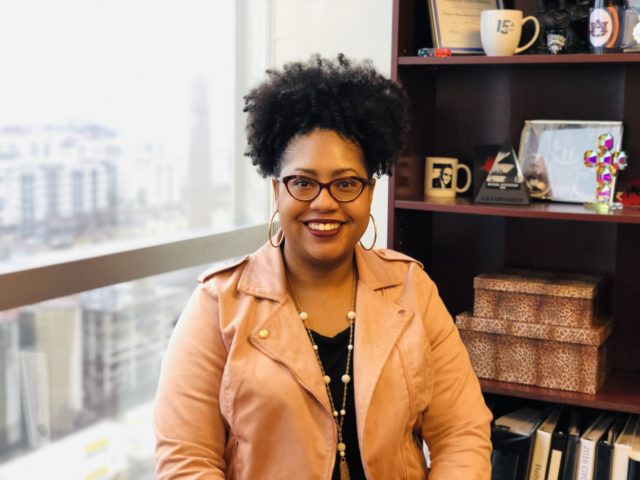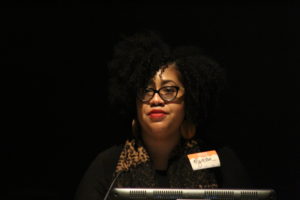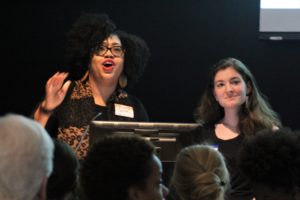
By Erica Wright
The Birmingham Times

Tracing her family’s history and creating conversation about Jefferson County’s racial past are not easy, but Myeisha Hutchinson won’t be deterred.
As president of the Woodlawn Community in Birmingham and an organizer of the Jefferson County Memorial Project (JCMP), a citizen-led coalition committed to telling the untold history of lynching in the county, she hopes to inspire others through education and conversation.
Talking about a memorial dedicated to African-Americans who were lynched or victims of racial terror may be unpleasant for some. “It’s not going to be easy,” Hutchinson said.
“There are going to be times when people are going to be uncomfortable. … There are going to be times when people are going to want to … just walk out of the room, upset, not wanting to talk about the realness of what happened, not understanding necessarily that this has nothing to do with anything [they] did.”
The conversation has to include the question of whether a black person can be seen as “a person who has the same ability, mind, heart as someone that’s not of color. That’s our issue,” Hutchinson said.
“We have fought so long for true inclusion, and there’s an extreme part of [various civil rights and social justice] movements that says we don’t need to fight for inclusion, we need to build our ‘own,’ [such as businesses, schools, banks]. But isn’t that causing more separation than we already have?
“It’s complicated when we think about modern-day movements that have started, like Black Lives Matter and then … All Lives Matter. Yeah, all lives do matter, but then there’s that constant reminder of how people of color are profiled, so there is a special reach to say black lives matter, brown lives matter, because for so long we haven’t been included.”
Hutchinson said the big takeaway is for reconciliation.
“It is the thought of creating equity for people, to understand the history of our country—[and] some of it is not pretty,” she said. “We’re talking about the level of terrorism related to race and hatred that has happened to people right on this soil, … right here. If we don’t fix our own house and be real about it, then how can we be this global, worldwide power? … I think that we can move that needle by having these discussions.”
Can it happen in our lifetime?
“No, I’m not gonna see it in my lifetime, but I wanna say I was part of something bigger for the next generation,” said the 35-year-old Hutchinson. “It didn’t happen overnight, so reconciliation won’t happen overnight. This is years’ worth of work, of conversation where people will finally see the lightbulb. … Why not [have] families, parents, religious institutions, educational institutions … just talk about it? How about we just give equal access and not allow it to be distorted but really tell this story of how we’ve overcome?”
Part of Hutchinson’s role with the JCMP is to work with community and faith leaders to create coalitions that will oversee the various lynching sites, in places like Bessemer, Leeds, Pratt City, and Irondale. These community coalitions will work with residents in their respective areas to establish historical markers that will complement the one planned for Linn Park.
“Within the lynching memorial that’s coming to Jefferson County [will], … of course, be sites [where] lynchings took place in cities like Birmingham, Pratt City, Bessemer, and other places. … [For each of those locations], there will be a coalition led by community leaders,” she said.
Hutchinson is also putting together her family tree, which has

been a challenge because her grandmother, her last living relative from Wilcox County, passed away at age 99 in July 2018. That’s what made her trip to the Equal Justice Initiative’s (EJI’s) National Memorial for Peace and Justice in Montgomery last year more powerful.
“My family is originally from Wilcox County, Ala.,” she said. “When [I] first turned the corner [in the museum] where the marker’s start, … I noticed Wilcox County, looked down, and saw a name that could potentially be my family member.
“It’s my family’s last name, [Gulley], so, essentially, I was like, ‘Oh my gosh, this could affect me,’ and I started crying. I had a friend with me, and I was thinking, ‘Well, what are we going to do to move this forward around the state beyond just the actual memorial in Montgomery?’”
Hutchinson said EJI Founder and Executive Director Bryan Stevenson had a goal of getting the markers to the counties from which they originated.
“We were going to have to build this memorial to go along with it—of course, not as grandiose as what [Stevenson] has done in Montgomery—but I thought it was important to bring it back to Jefferson County because this is an important topic,” Hutchinson said. “No, there aren’t modern-day lynchings happening, but there are still undertones of racial and social discriminations and injustices happening.”
Hutchinson said she’s currently researching what happened to her potential family member, Riley Gulley, of Wilcox County.
“How he was quote-unquote lynched is horrendous,” she said. “I’m investigating and the next steps for me to put my family tree together, so I’ll be working with some people I’ve connected with through the JCMP to find that out.”
Hutchinson said she has told her family about her findings.
“Within minutes of seeing his name, I took a picture of it and immediately sent it to my family,” she said. “The Wilcox County courthouse burned down, so it’s been rather hard for us to even put together a family tree. It’s complicated because that courthouse burned down and because all my grandparents and their siblings are deceased. That’s why I’m enlisting someone who does genealogy on a professional level.”
For more information about the Jefferson County Memorial Project, visit www.jeffersoncountymemorial.com.
To read about the report findings on the 30 lynching victims in Jefferson County, click here.



